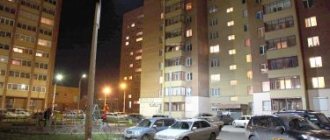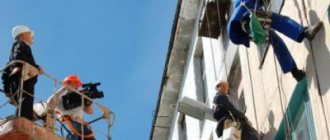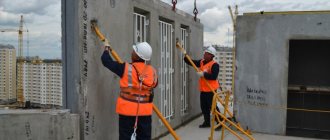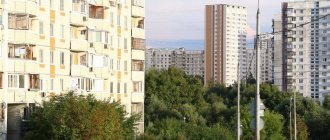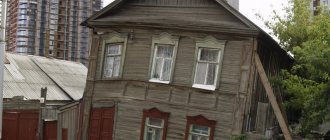What is the difference between a major overhaul and a current one?
Current repairs are the maintenance of communications and engineering structures of the house in good condition, namely:
- Elimination of minor defects.
- Strengthening equipment and structures to prevent their further destruction.
- Repairing cracks in the walls of the house.
- Strengthening and replacing communications, etc.
Current repairs do not require the preparation of design documentation.
Major repairs are a set of works aimed at eliminating, replacing or restoring important elements of an apartment building:
- Repair and renovation of the roof, basement, utility rooms.
- Repair of the elevator or replacement of its cabin in case of complete malfunction.
- Repair of electrical and sewerage communications.
- Installation of metering devices at home (electricity meters, hot and cold water and heating meters).
Major repairs also mean replacing more than 50% of the total area of the faulty structure or utility lines.
The relationship between residents of an apartment building and representatives of public utility services is regulated by the norms of the Housing Code of the Russian Federation and Federal Law No. 271.
The above Federal Law does not directly affect the subtleties of repair work. It only makes changes to the Housing Code of the Russian Federation.
Changes that were made to Federal Law No. 271 obligated tenants and owners of residential premises to independently pay for major repairs in their home. This obligation is also enshrined in Art. 210 Civil Code of the Russian Federation. Also in accordance with paragraph 1 of Art. 169 of the Housing Code of the Russian Federation, owners of premises are required to pay monthly contributions for major repairs of the house.
Major repairs are carried out in order of priority, which is affected by:
- The lifespan of the property.
- Date of last repair work.
- Area of the object.
- Degree of wear of structures and communications.
- The amount of money in the fund.
- Scope of required work.
In some cases, residents of apartment buildings are forced to wait 10-15 years for major repairs. During this time, the money fund depreciates due to annual inflation. As a result, when the turn comes, utility workers are not able to complete the previously agreed amount of work.
You can view the queue for major repairs on the official website of the State Corporation Housing and Communal Services Reform.
Sources of financing for the renovation of a high-rise building
Monthly Owner Payments
Funds for these purposes include:
- finances contributed monthly by apartment owners for the maintenance of joint property (the amount of payment for major repairs is determined by the general meeting);
- targeted funds from owners for individual repair items.
Budget money
Over the past years, almost no contributions have been made for repairs and modernization of the house, since the city authorities did not have money, and the owners did not consider this an obligation in accordance with the law. The problem of capital restoration of the multi-apartment sector has reached a level where the owners of the privatized fund are not able to solve this problem. Therefore, to spend budget funds, new targeted programs are being developed to finance capital repairs of buildings. The new approach consists of the following provisions:
- Local authorities do not influence the opinion of owners on the conduct of repair and restoration work.
- Money from the budget is allocated for work in conditions of co-financing of expenses with apartment owners.
- Consideration of the issue of allocation of funds occurs after the submission of an application from the partnership based on the decision of the general meeting.
- Repair work involves not only the restoration of physical and functional wear and tear, but also modernization aimed at saving thermal and other resources in the multi-apartment sector.
- In the absence of targeted funds in the budget for these items, money is first allocated on a competitive basis according to the previously announced general criteria for the depreciation of houses.
Creation of a coordinating fund
To regulate the use of the new mechanism in terms of providing budget money, Law of the Russian Federation No. 185-FZ is adopted and the State Fund for Assistance to Housing and Communal Services Reform Corporation is created. The Fund provides financial assistance to Russian regions and municipalities that provide subsidies to homeowners for repair work.
It should be emphasized that it will not be possible to solve the problem of repair and modernization of the multi-apartment sector by creating only a fund, as evidenced by the foreign experience of countries at the stage of transition economies. Therefore, it is advisable to use credit funds to restore houses.
Lending for modernization of the multi-apartment sector
The use of borrowed cash flows is stopped by the following problems:
- The society of co-owners of apartments in a multi-storey building does not have suitable property that can be used as collateral before the bank, and the owners do not want to carry out such an action with their square meters.
- The owners' association, according to the bank, does not belong to the category of reliable borrowers, since, within the framework of the law, it can be liquidated if more than 50% of the owners leave the company.
- Management organizations (for example, housing office) have a certain advantage over banks, although the management agreement can be terminated and the method of decision-making changed by the decision of the meeting at any time.
The main direction of the new direction for lending for renovation activities in the multi-storey sector may be to reduce interest rates through government subsidies and reduce risks for the bank by providing guarantees by apartment owners and office managers. The state is working on the availability of loans, but for now such measures are in a draft state, and their implementation is being discussed.
What does the law on capital repairs of apartment buildings say?
Until 2012, major repairs were carried out using funds from the municipal fund. Federal Law No. 271 radically changed the algorithm for collecting funds. Now major repairs are carried out exclusively through contributions from apartment owners. At the same time, the monetary fund is distributed among all participants in the housing and communal services reform.
The amount of monthly contributions is set by regional authorities. That is, the exact amount is not legally fixed today. The amount of contributions also directly depends on the area of the living space. The main condition is that the apartment owner must make mandatory payments on time.
All funds collected are sent to a special fund for capital repairs of housing and communal services, which has been created in each region of the country. Current legislation provides residents of apartment buildings with the opportunity to transfer money to an individual bank account. In order to open a special bank account and start saving money to renovate their own home, all residents must take part in a general meeting.
Important: carrying out major repairs does not relieve the residents of the house from the obligation to make further monthly payments.
New in blogs
On December 2, 1988, Resolution of the Council of Ministers of the USSR No. 1400 “On the sale to citizens of apartments in state and public housing stock” was adopted. But the Soviet people could no longer buy these apartments from the state, because the country had entered the era of wild capitalism , and people simply did not have that kind of money. Since 1990, as a result of the “freezing” of Soviet cash deposits and the monetary (“Pavlovsk”) reform carried out in January 1991, the multi-billion dollar savings of Russian citizens were destroyed by 1992.
On July 4, 1991, B. Yeltsin signed the Law of the Russian Federation of July 4, 1991 N 1541-1 “On the privatization of housing stock in the Russian Federation ,” which provided for “the free transfer or sale into the ownership of citizens on a voluntary basis of residential premises occupied by them in the state and municipal housing stock." And everyone rushed to privatize apartments, despite the fact that at the time of privatization, apartment buildings (hereinafter referred to as MKDs) were already in need of major repairs.
After which, all sorts of housing offices, even in Soviet times, who did not particularly like to deal with their duties, stopped servicing the apartment buildings altogether, explaining their inaction by the fact that the maintenance of common property is now the responsibility of the owners of the apartment buildings. The same replies to citizens’ complaints came from municipal authorities.
In turn, local authorities began to offer residents to participate in co-financing during major repairs. And then Federal Law No. 271 of December 25, 2012 “On amendments to the Housing Code of the Russian Federation and certain legislative acts of the Russian Federation and the recognition of certain provisions of legislative acts of the Russian Federation as invalid”, and completely obliged residents of apartment buildings to carry out major repairs at their own expense , making mandatory payments to the Capital Repair Fund .
When our citizens realized that they were “stuck in the elevator,” they began to carefully read the “instructions,” that is, the very “Law on the Privatization of Housing Stock in the Russian Federation,” and found a very interesting article 16 in it.
Article 16. Privatization of residential premises occupied by citizens in houses requiring major repairs is carried out in accordance with this Law. At the same time, the former landlord retains the obligation to carry out major repairs of the house in accordance with the standards for the maintenance, operation and repair of the housing stock in the manner established by the housing legislation of the Russian Federation.
Law of the Russian Federation dated July 4, 1991 N 1541-1 (as amended on December 20, 2017) “On the privatization of housing stock in the Russian Federation”
The state has not fulfilled its obligation to overhaul apartment buildings.
Thus, this very strange organization - the Capital Repair Fund, in violation of Art. 189 of the Housing Code of the Russian Federation, without holding a general meeting of the owners of the house on the decision to carry out major repairs, without the minutes of these meetings, she arrogated to herself the authority to collect funds for these repairs. When Article 16 of the Law “On the Privatization of Housing Stock in the Russian Federation” retains the former landlord (the state, represented by local authorities), the obligation to carry out major repairs of apartment buildings.
Therefore, on completely legal grounds, apartment owners in court demanded that local authorities carry out major repairs of their houses. Courts in the Russian Federation have already satisfied hundreds of claims in favor of residents of apartment complexes for tens, or even hundreds of billions of rubles. Local authorities are obliged to implement court decisions that have entered into legal force. And the fact that they do not have the money for this does not excuse them from paying off the debt. Therefore, local authorities began to turn to the federal authorities with applications for the allocation of funds.
Then federal officials began to think about how to again fail to fulfill their obligation to carry out major repairs in the apartment building. We thought and thought and came up with an idea! By Federal Law No. 399-FZ of December 20, 2017, the Government of the Russian Federation amended part one of Art. 190.1. Housing Code of the Russian Federation , according to which “the obligation to carry out major repairs in an apartment building arises for the authorities if at the time of privatization of the first apartment the authority decided to carry out major repairs, but it was not carried out . This amendment contradicts the conditions of privatization set out in the Law of the Russian Federation “On the privatization of housing stock in the Russian Federation.”
Even if such a decision on the need to carry out major repairs of this or that apartment building, before the privatization of the first apartment, exists in the archives of the Local Administration, then who will issue it to the residents, it will most likely be destroyed.
Now we need to cancel these amendments as discriminatory, and then the activities of the Capital Repair Fund for Apartment Buildings will become completely illegal. Unless the officials come up with something again!
To pay or not
Housing legislation obliges all tenants to make monthly payments to the capital repair fund. However, some citizens are exempt from this obligation.
In accordance with paragraph 2 of Art. 169 of the Housing Code of the Russian Federation, residents of an apartment building, which in accordance with the established procedure has been recognized as unsafe and is being prepared for demolition, are exempt from paying monthly contributions.
In addition, some categories of persons have benefits in paying contributions for major repairs in the amount of 50% (the state compensates contributions from the federal and regional budgets):
- Disabled people of groups 1 and 2.
- Combat veterans.
- WWII veterans.
- Owners of residential premises who have reached 70 years of age. In this case, these citizens must live alone or with incapacitated relatives.
- Labor veterans.
The following can claim a 100% benefit:
Elderly persons who have reached 80 years of age, provided that they live alone or with incapacitated relatives.
Heroes of Russia and the USSR, holders of the Order of Glory and close relatives living with them in the same territory.
Important: compensation is not calculated based on the total monthly contribution. The discount is provided within the regional preferential norms.
In addition, residents of new buildings whose service life does not exceed 5 years are exempt from payment. This exception is due to the fact that during the first five years of operation of a residential building, all financial expenses associated with current and major repairs are borne by the developer.
Federal Law 271 on contributions for capital maintenance of apartment buildings
- Funds are deposited using receipts and credited to the account of a special fund.
- The state budget is spent only if the residents were forced to move to another building because the old one was declared unsafe.
- The minimum contribution amount is determined by the legislative act of the constituent entity of the Russian Federation, corresponding to the methodological recommendations approved by the government. When calculating the fee, the occupied living space in the building is taken into account.
- The payment amount is calculated in rubles. For this purpose, the payment amount established in the region for 1 sq. m. meter is multiplied by the total area of housing.
The Federal Law introduced in 2012 obliges residents to pay for major home repairs by making contributions. Residents of cities of federal significance will have to pay slightly more than persons living in settlements of regional and district significance.
We recommend reading: Large family, benefits at work for the father
Procedure for financing repair work
To draw up a unified renovation plan for an apartment building for several years, it is important not only to determine the importance of individual types of repairs, but also to resolve financial issues in the field of economic assessment of the receipt of cash resources from homeowners. The main role is given to cost recovery, saving money on routine maintenance, timely elimination of accidents, and reducing the amount of resources consumed.
The management organization offers a justified, economical option (procedure) for financing major repairs or individual processes, while the owners choose from the following mechanisms:
- The monthly money contributed by apartment owners accumulates until the amount is sufficient to finance the repairs; the duration of the collection depends on the size of the payment, the required amount and the capabilities of the owners.
- The possibility of an additional targeted collection is established, which is used together with the accumulated money from monthly receipts.
- Use of bank credit capital with compensation from the monthly receipt of due contributions.
- A combination of a bank loan and funds from the city's capital improvement financing program for a specific home.
As a result of changes in the collection of funds to finance the repair work of each individual building, apartment owners will be able to control the use of money and the quality of work performed during major repairs of apartment buildings. Whether or not to pay monthly fees is a question that concerns every apartment owner, but with a competent approach and collection of such payments, the house will be repaired on time and at the residents’ own expense.


